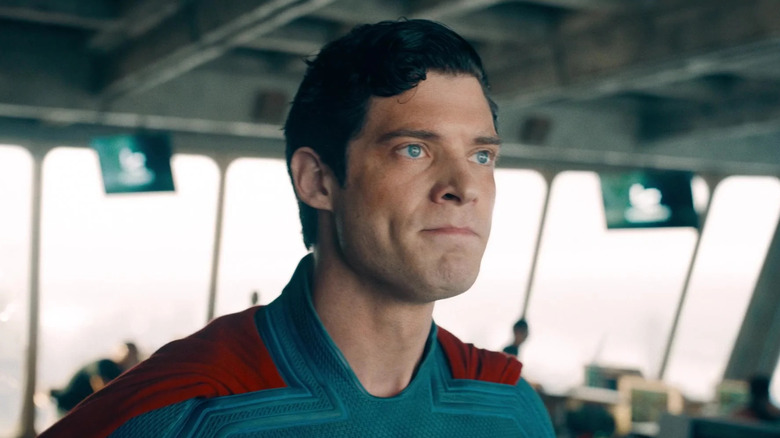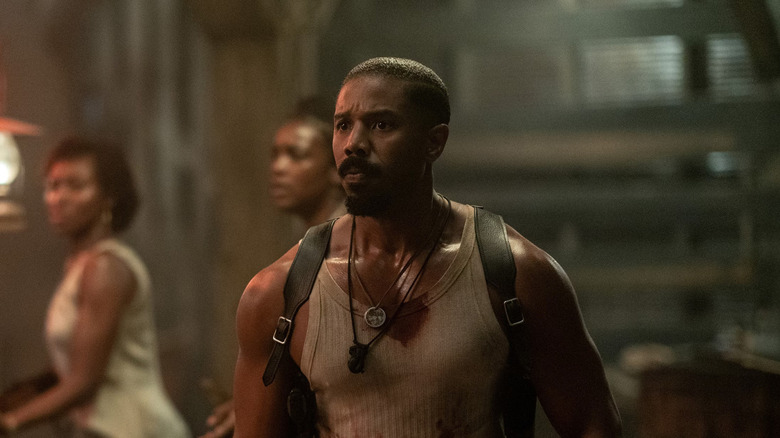One Studio Exec Disagrees With Theaters & Studios On Why Audience Numbers Are Down
Hollywood's hopes were sky high for the 2025 summer movie season. With three superhero tentpoles ("Thunderbolts*," "Superman," and "The Fantastic Four: First Steps"), two primed-to-explode live-action remakes of beloved animated classics ("Lilo & Stitch" and "How to Train Your Dragon"), the Brad Pitt racing drama "F1: The Movie," and Tom Cruise bidding adieu to Ethan Hunt in "Mission: Impossible — The Final Reckoning" in the offing, studios and exhibitors believed attendance would at least be vastly improved from 2024. The dream scenario was that people would return to theaters at pre-Covid numbers.
It's not quite a nightmare result, but it is a distressing sign for the health of the movie business that a stacked summer fell $7 million short of 2024's $3.67 domestic box office haul. How did this happen? For starters, James Gunn's "Superman" hit the "Superman" ceiling internationally (and prematurely debuted on streaming after a month-long theatrical run to juice the streaming numbers for "Peacemaker" season 2), the Marvel Cinematic Universe is no longer a billion-dollar worldwide guarantee (even when it's trotting out A-list characters like the Fantastic Four), and the heavily hyped horror sequel "M3GAN 2.0" tanked with a $39.1 million global box office gross. (The original "M3GAN" closed its theatrical run in 2022 with over $180 million.)
Is this an inflection point for theatrical exhibition? I maintain that what audiences crave at this uncertain juncture are bold original visions from the most talented filmmakers working today (as evidenced by the runaway box office success of both Ryan Coogler's "Sinners" and Zach Cregger's "Weapons"), but most of the executives employed by the major studios (Warner Bros.' Mike De Luca and Pam Abdy are the exception here) are ride-or-die on IP-driven franchises. Given that "Jurassic World Rebirth" cleared $847 million worldwide this summer, there's reason to believe this is the safest, most practical way forward for the business.
That is, if there's to be a business as we know it now. In her 2025 summer postmortem, The Hollywood Reporter's Pamela McClintock quotes a "top studio executive" who thinks the film industry is, in many cases, chasing an audience that doesn't exist. "I'm very, very nervous for the future," they explained. "There are all these studios and companies making movies. I don't think there is enough of an audience for them."
Most studio chiefs and certainly exhibitors strongly disagree with this sentiment. But let's hear this anonymous exec out. Are viewers inundated with motion picture options?
We have a quality-not-quantity problem with movies
The streaming era has absolutely plunged us into a media maelstrom. Multiplexes aren't quite as taxed as they once were (back when it was rare to dedicate more than one screen to a new release unless it was a full-blown, preordained blockbuster), but that's only because many films that would've once received a theatrical release are now getting sent straight to streaming instead. Similarly, there was once a time when Netflix's "Happy Gilmore 2" would've been one of this summer's biggest theatrical hits. Even Spike Lee's critically-acclaimed "Highest 2 Lowest" was shortchanged by Apple, considering that, as a kidnapping thriller with Denzel Washington in the lead, it could've easily done major business on the big screen.
I appreciate that Netflix's Ted Sarandos has a vested interest in declaring the death of theatrical exhibition, but he's full of it. This year, I brought different groups of friends out to the theater (where some of them hadn't been in a while) to see crowd-pleasing triumphs like "Sinners," "The Phoenician Scheme," "The Naked Gun," and "Weapons." The houses were generally two-thirds full, and people hooted, hollered, and whatnot as these first-rate filmmakers worked them over. It was bliss.
2020 wasn't so long ago that people can't fall back in love with going to the movies again. If "Lilo & Stitch" or "Jurassic World Rebirth" disappointed commercially, I'd be legitimately worried. But people flocked to the stuff to which they traditionally flock. Honestly, I think the studios should go back to longer theatrical release windows. They're only hurting themselves by treating multiplexes as glorified boutiques. More than ever, a lot of people want to get out of their house, drown out the horror of our world, and lose themselves in a movie — and if things break the way they're threatening to break, this yearning for escape will only intensify over the next year.
Obviously, the digital filmmaking era has allowed more people to knock out motion pictures in a shockingly short period of time. Alas, most of these movies look unremarkable, if not outright terrible — and this applies to many studio releases. But if studios were to treat theaters like dream palaces again, where you could only see the latest films from great filmmakers and major movie stars, their fortunes might improve. The pivot to streaming was a self-inflicted wound. Cauterize it and be more like De Luca and Abdy. The future of theatrical exhibition needn't be so dim.

